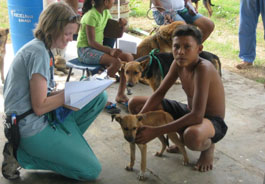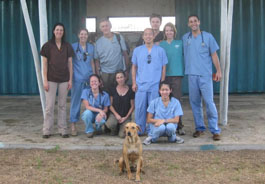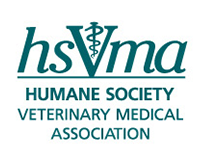International Veterinary Outreach (IVO) of UC-Davis Goes To Jiquilillo, NicaraguaBy Eric Eisenman  Second year UCD veterinary student, Whitt Hoffman, gets more information about a patient at the December 2011 IVO clinic in Jiquilillo, Nicaragua. Eric Eisenman It was December 16th 2011, and we had just finished our fifth and final day of clinics in Jiquilillo, Nicaragua. I had just jumped into the Pacific to cool down from a surprisingly short week and was sitting with the rest of the group, indulging in scrumptious fresh fish, rice, beans, and salad. It had been a long road to get where we were, and it was just starting to sink in that we had made a major accomplishment for the animals of Nicaragua. The idea of starting a student-run international veterinary organization came to me in March 2011, during a presentation by Dr. Richard Bachman, a former HSVMA Leadership Council member. He spoke about his experience working with Oregon State University’s International Veterinary Student Association (IVSA) program that organizes veterinary trips to Nicaragua. I asked myself: If Oregon State can have an international student-run program, why doesn’t my university (UC-Davis) have one? Prior to veterinary school I volunteered in Latin America with numerous organizations, but I had never organized a major project like what they were doing at OSU. I researched to see what it would take to start a program like this. I talked with fellow members of the UCD HSVMA Student Chapter and other classmates to gauge their levels of interest and contacted Dr. Susan Monger, International Program Director for HSVMA-RAVS, for insight and recommendations. It was when fellow classmates started showing their incredible support that I knew we could do this as a team. We looked for a location abroad where we would be able to maximize our impact. Dr. Monger led me to Don Montgomery and Gerry Caceres, the business partners running Monty’s Beach Lodge in Jiquilillo. Nicaragua is the second-poorest country in the western hemisphere, but that doesn’t stop Don and Gerry from working on humanitarian projects such as building schools, a medical clinic, a fire department, a community center, and more. After my first chat with Don, I immediately recognized his genuine philanthropic nature. Don informed us about canine overpopulation in the community and the lack of available veterinary care. Over the summer, Dr. Eric Davis, the former HSVMA-RAVS director who is now affiliated with UC Davis, informed me of his interest in our program and offered his invaluable service as our mentor. Students started focusing on more specific roles like budget, fundraising, inventory, logistics, and permits, and we submitted paperwork to start the process of becoming a 501(c)(3) nonprofit organization under the name International Veterinary Outreach (IVO). Fall quarter was in full throttle when the group decided to plan a reconnaissance trip for December. We received support from HSVMA, Boehringer Ingelheim, and CP Medical. Dr. Davis helped us fill in the gaps with needed supplies and helped the students prepare most other aspects of the trip. Dr. Ahne Simonsen, who is now an HSVMA-RAVS staff veterinarian, participated as a volunteer veterinarian. Gerry was preparing for us by driving up and down Jiquilillo’s only road with a megaphone, notifying community members. We were all packed up with appropriate veterinary supplies and equipment when we checked in at San Francisco International Airport. Our partners in Nicaragua were to pick us up the following afternoon in Managua.  The IVO team after a hard day's work. Eric Eisenman We arrived to Monty’s Beach Lodge right before the sun set behind the ocean and geared up for our first day of clinics. The next morning, we set up our clinic at the community center in Jiquilillo, which consisted of a shipping container with an extra roof extended over it. By the time we were set up, there were already people patiently waiting with their dogs. Students triaged, performed physical exams, and gave appropriate vaccinations and treatments. We were well received by the community and we were doing what we came there to do! Our next four clinical days were split between the communities of Jiquilillo and Padre Ramos. Everyday people trickled in with their pets, some of them being very difficult cases. We saw a total of 171 animals. Most of them were dogs (162), but we also saw some cats (6), a pig, a horse, and a cow. Most dogs and cats received vaccinations and treatments for internal and external parasites. Under Dr. Davis’ supervision and guidance, we performed 20 spay/neuter surgeries, and chemotherapy for four transmissible venereal tumors. We treated a variety of medical conditions, greatly increasing the quality of life for the animals. During dinner later that night, the team celebrated the completion of our first trip. Once again, Dr. Davis led the group in another rounds discussion. We were already talking about the next trip, the future of the program, and how we can continue to serve the animals in Jiquilillo. It was the end of the beginning, and the hardest part was over. It had been an amazing learning experience and we were ready to share it with more of our colleagues because they will be the next generation of veterinary students to pass the torch.  Eric Eisenman Eric Eisenman is in the class of 2014 at the UC Davis School of Veterinary Medicine, and the president of both the UC-Davis HSVMA Student Chapter and IVO. International Veterinary Outreach (IVO) is a student-run nonprofit organization that provides free veterinary care to underprivileged communities abroad, allows veterinary students to develop clinical skills and build intercultural relationships, and promotes animal welfare with community education. |
